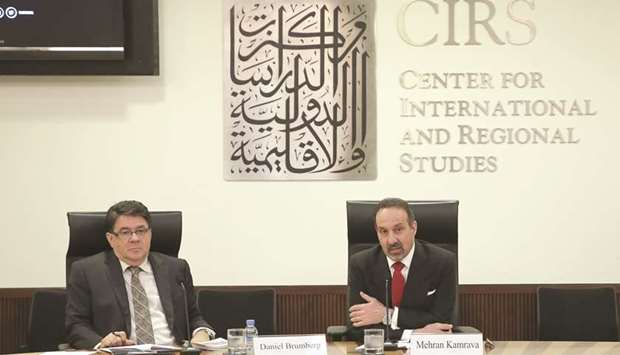How has the relationship between Iran and the US shifted since the start of Donald Trump’s presidency? And what does the future hold?
These were some of the questions that Professor Daniel Brumberg, co-director of democracy and governance studies at Georgetown University, addressed in his recent talk at Georgetown University in Qatar’s Center for International and Regional Studies (CIRS). Brumberg, who also teaches GU-Q students remotely from the university’s Main Campus in Washington, DC, explored the countries’ complicated diplomatic history in his lecture.
He explained that the US had no clear Iranian strategy for many years, and was left with limited options in the face of Iran’s nuclear ambitions and rising regional influence.
“We had a very short menu of choices: you can either go to war, and there’s no such thing as a short-term war,” he explained.
“Another alternative is engagement in diplomacy (some sort of negotiated outcome) and another alternative is containment and deterrence. You have to choose, and for a long time, American policy makers didn’t want to choose.”
The scholar explained that the nuclear agreement, negotiated under former US president Barack Obama, was a diplomatic effort that provided clearer strategic aims for the United States’ relationship with Iran.
He stressed the importance of this agreement for stability in the greater Middle East region.
“Daniel Brumberg is one of the most astute observers of Iran,” said CIRS director Dr Mehran Kamrava.
“He has always been one of those scholars who has continued to shape the discipline, with his research greatly influencing how we understand the evolving nature of authoritarianism in the Middle East.”
Brumberg has authored and edited numerous books on Iran, including Reinventing Khomeini, The Struggle for Reform in Iran, Conflict, Identity, and Reform in the Muslim World: Challenges for US Engagement, and Power and Political Change in Iran.
He holds a PhD from the University of Chicago and has previously served as a consultant to the US Department of State and the United States Agency for International Development.
Established in 2005, CIRS is a research institute devoted to the academic study of regional and international issues through dialogue and exchange of ideas, research and scholarship, and engagement with national and international scholars, opinion-makers, practitioners and activists.

Professor Brumberg and Dr Kamrava at the talk.
